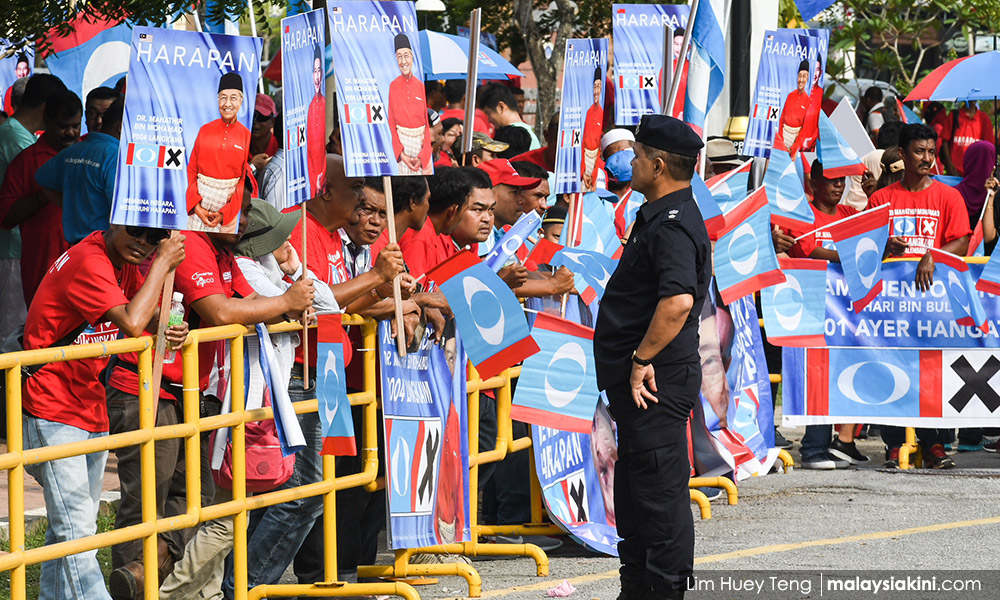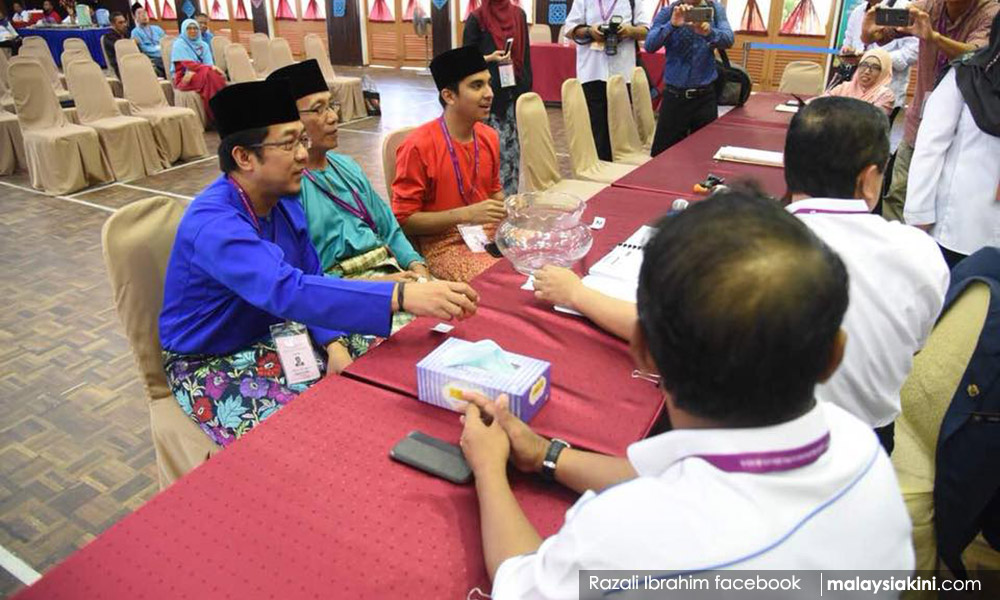
The spate of disqualifications of candidates from Pakatan Harapan during nomination day was a distinct whiff of déjà vu for me.
More than two decades ago I was disqualified from the 1995 general election nominations on the technicality that a third duplicate form lacked my campaign manager’s witnessed signature, a technicality which the returning officer had the authority to remedy but chose not to.
We are still witnessing such skulduggery by some election officers to disqualify opposition candidates. In my case, my witness and campaign manager, Richard Yap – a staunch DAP supporter who had been hanging around the DAP HQ for years had signed two of the forms but unbeknown to me, had omitted to sign the third form.
In many such cases, the election officer would ask the candidate to complete the third form there and then. However, in my case. the returning officer (RO) was none other than president of the then MPPJ, Mohd Nor Bador, a BN appointee with whom I had had frequent clashes with in the Petaling Jaya municipal council in my capacity as the PJ member of Parliament.
Mohd Nor’s decision was clearly a violation of the principle of “free and fair elections” since the role of the returning officer is to act impartially and to ensure that the forms are in order. However, he accepted my forms without comment and then made it his business to point out my second witness’ missing signature to BN supporters at the gate!
As a matter of fact, on that nomination day in 1995 throughout the country, there were other cases similar to mine such as that of my comrade Chong Joon Kin who was standing in Kampar. In his case, the returning officer simply told him to rectify the mistake and accepted his forms.
Again, in the 2008 general election, incumbent Kuala Kangsar MP Rafidah Aziz left one of her forms unsigned during nomination. Nevertheless, the Kuala Kangsar returning officer Mohd Ghazali Jalal allowed her nomination without any fuss.
The returning officer called me up after the ‘bantahan’ (objections) period had lapsed to inform me that he was disqualifying me as a candidate. I protested vehemently but he would not have it any other way. At that very moment, I felt the full impact of BN dishonesty since the Elections Regulations (Conduct of Elections) clearly stipulate that such omissions are of no material significance:
“4.(6) Failure to comply with paragraph (3), (4) or (5) shall render the nomination paper liable to be rejected by the returning officer:
Provided that no nomination paper shall be rejected on account of:
(i) Any error or omission in the nomination paper in relation to the description of, or any particulars in respect of, the candidate, or his proposer, or his seconder, if the particulars contained in the nomination paper are sufficient to identify the candidate, or his proposer, or his seconder, as the case may be;
(ii) Any error or omission with regard to any place specified in the nomination paper, if such place is otherwise sufficiently identifiable from the particulars given in the nomination paper; or
(iii) Any error or omission which is capable of being corrected and is corrected upon being brought to the attention of the person presenting the nomination paper;
Provided further that the returning officer may direct that any clerical or printing error in the entries in the nomination paper be overlooked if the error is not of any material significance and does not affect the identification of the candidate, his proposer, or his seconder, or the identification of the constituency in respect of which the nomination paper is delivered …”
Note that the witness to the signature of the form is not even mentioned in the above regulation but only the proposer and seconder, who also accompanies the candidate into the nomination centre. The witness does not need to be present at the nomination centre at all.
Perhaps the best lawyer in the land, Raja Aziz Addruse agreed to be my legal counsel and a group of lawyers also volunteered to assist him in challenging the decision in court. They stressed that:

(i) My nomination was complete – The Regulations, Section 4.(1) refer to the nomination paper which is submitted in triplicate. In my case, the nomination paper and the second copy were complete, it was the third copy which contained the omission of the witness’ signature. It must be noted that the law stipulates ‘triplicates’ referring to “carbon copies” in which case the practice of “photocopies” would not apply.
(ii) Omission is not a basis for disqualification – “omission” on only one copy of the nomination paper, when the original and the second copy are complete, cannot be construed as “intending to mislead”. After all, all the relevant information is available in the first two papers. Therefore, omission is not a basis for disqualification as the courts found in the parallel case of Abdul Karim v Mohamed Taib & Anor (1960).
Small omissions only
But even in the case of an error or omission on the original nomination paper itself, a remedy is provided in Regulation 4.(6) (iii): “No nomination paper shall be rejected on account of any error or omission which is capable of being corrected and is corrected upon being brought to the attention of the person presenting the nomination paper.”
They cited the case of Khoo Kay Por v Ooi Kwong & Anor (1980) when the candidate had written his signature in the place where he should have written his name, for which he was disqualified. The court ruled that such an error was not calculated to mislead and therefore his nomination was valid.
(iii) Negligence of the returning officer – The lawyers further pointed out that after my nomination forms had been submitted, it became the responsibility of the RO to ensure that they were in order. The omission on the third copy of the form was “capable of being corrected”, yet the RO did not “bring this to the attention of the candidate”.
Consequently, the RO failed to allow the omission to be corrected. Thus, the serious question arises as to why the RO failed in his duty to have the omission corrected. There were many cases of returning officers discharging their duty responsibly.
All over the country, both small omissions and more serious mistakes in form completion were pointed out by them and duly corrected. In many instances, the ROs went out of their way to assist the candidate with their forms, for example allowing extra numbers to be deleted and the spelling of names to be altered.
This illustrates the point that the role of the returning officer is essentially to ensure the smooth running of the nomination process and not to disqualify political opponents unfairly.
The group of concerned lawyers referred to the Election Act Part II.5(1)(a) which says that election officers should display “fairness, impartiality and compliance with Part VIII of the Federal Constitution” in carrying out their duties.
This rests on the Federal Constitution Part VIII 114. (2) which stresses the importance of securing an Election Commission which enjoys public confidence. They found the decision by the returning officer in my case to be not only harsh, but it was also wrong in law:
“We further support the view that the candidate has every right to be allowed to offer his or her services to the people, a right which should not be determined by judgements on minor technicalities. We believe that this right should only be infringed in circumstances which could seriously affect the candidate’s ability to serve, such as being of unsound mind, having a criminal record or being a bankrupt.”
In fact, the Bar Council had raised another important principle of the enfranchisement of the citizens of Malaysia. Under the Federal Constitution Part VIII 119. (1), the right to vote is seen as a fundamental element in the democratic process.

Thus, my disqualification as a candidate in the 1990 general election not only denied me the opportunity to represent the voters of PJ Utara but also the voters of that constituency the opportunity to choose their candidate.
Judge writes letter
As my election petition approached, there was another precedent in August 1995 when Judge Azmel Maamor decided at the Kota Baru High Court that the rejection of the nomination paper is not mandatory. This would have guaranteed the success of my petition.
Thus, it was clear I had a good case when I filed my election petition against my disqualification as a candidate for the PJ Utara parliamentary constituency in the 1995 general elections and it was heard at the Shah Alam High Court before Judge Abdul Hamid Mohamed on 27 June 1995.
I felt confident of winning the case since perhaps the best lawyer in the land, Raja Aziz Addruse had undertaken to argue my case on a pro bono basis.
Unfortunately, before we could go into the merits of my case, the counsel for the respondent sprung a “preliminary objection” regarding the translation of my petition. My counsel Raja Aziz stood up to put forward his arguments why this “preliminary objection” should not be allowed.
First and foremost, the counsel for the respondent had failed to first put in a formal application or notice of motion. This “preliminary objection” had been raised at the eleventh hour without notice. It was completely unethical and deprived my counsel of the opportunity to prepare a counter- argument and quote authorities. This is an elementary procedural point and should have been followed.
The judge completely ignored this fundamental objection raised by Raja Aziz and decided to uphold this small technical point raised by the respondent’s counsel. The case was over before noon.
The next day, The Sun newspaper reported the case of my election petition under the banner headline: ‘Foiled again!’ Judge Abdul Hamid Mohamed took objection to this banner headline and wrote a letter of protest to The Sun on Sept 7, 1995, defending his Sept 4 judgement and attempted to explain “what happened that day”.
I replied with a letter to the same newspaper on Sept 9, 1995, stating that it was no business of the judge to protest against The Sun’s choice of banner headline: ‘Foiled again!’ I said there was nothing factually wrong with the headline. My attempt at being a candidate in the April 25, 1995, general election had been foiled by a BN-appointed returning officer over a trivial technical matter.
I further pointed out that in his letter, the judge had failed once again to mention my counsel Raja Aziz’ objection to the respondent’s counsel’s “preliminary objection”, the procedural point which was not followed by the judge. This was a fatal omission in the judge’s clarification. I ended my letter thus:
“The Sun’s report of the case correctly highlighted the astonishing fact that a principle of such great consequence to the system of parliamentary democracy in this country should be trivialised into nitpicking over small technical points of procedure.”
KUA KIA SOONG is human rights organisation Suaram's advisor. - Mkini



No comments:
Post a Comment
Note: Only a member of this blog may post a comment.